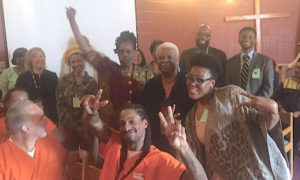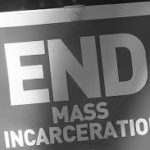The Pressing Need
Mass Incarceration in the US has become a major concern for political, social and religious leaders throughout the country due in part to the large number of persons who are in prisons and otherwise under the supervision of the Criminal Justice System. While persons of every ethnic and racial background are caught in this expansive system of incarceration, the high percentages of African America and Latino inmates is particularly troubling.
By some estimates almost 1 in 3 persons of African American descent are deeply impacted by that system. The stigma of incarceration, its disruptive impact on children and families and the difficulty ex-inmates have finding employment, housing and constructive roles in their communities create a self-perpetuating situation that demands strong and sustained attention by congregations attuned to the call for restorative justice. Christian denominations have a rich history of speaking to issues of justice in their community activity and in their social teachings and congregations across the denominational spectrum have had strong interest in criminal justice issues and the penal system’s approach to punishment and reform, and many are deeply engaged in traditional or progressive programs for the incarcerated or those who are re-entering the community. The magnitude of the problem currently is drawing fresh and sustained attention and loud calls for change in the system as well as action within congregations to help mitigate problems faced by persons re-entering communities after incarceration. Families in many congregations are impacted by incarceration; the African American church community, for instance, will have among its members, children and adults whose relatives have been or are incarcerated. In many communities, pastors are often the first person called when someone gets arrested, has to go to court or needs a reference for a pre-sentencing hearing. But the complexity of the problem and the deep need of ex-inmates and their families require not only compassion and consistent engagement but also well-articulated approaches founded on clear theological understanding and implemented with skill, if they are to be effective.
This certificate of studies acknowledges the Church’s awakening call to action on issues of social justice and believe that, consistent with its mission and identity, the Church’s unique offering in this area is to bring together its work for justice in community with its commitment to and capacity for spiritual formation. To be effective in this arena, more congregations need to develop the leadership, structure and competence needed to provide opportunities for directed spiritual growth, discernment and reflection in conjunction with their community service. The seminaries of the Consortium are in an excellent position to provide training to Church leaders and the laity and so create a cadre of skilled persons who can and will lead efforts and programs in local congregations aimed at addressing incarceration and its impact. It is with this in mind that we propose adoption of this certificate by the Consortium.
Criminal Justice Certificate-Enrollment Form
Requirements of the Certificate
The Certificate in Criminal Justice and Reconciliation in the TransformativeCongregation will prepare men and women studying for leadership in the Church or those already in ministry to develop and lead programs that address the needs of returning inmates. This will be done through a set of courses and in the context of a small group re-entry models offered by local congregations. The certificate will draw three-quarters of its courses from existing offerings in the curriculum of the Consortium and the final course will be a new practicum to be developed specifically for the certificate. The following areas for course-work are proposed, with provision for their satisfaction included in italics. Visit “Search Courses” under the Certificate of Criminal Justice category for specific courses.
1. Theological and Ethical Approaches to Social Justice: This area introduces students to theological and ethical theories and approaches to issues of social justice and the resources these approaches provide for understanding and addressing such issues as crime, punishment, reconciliation and restoration; and their implications for work with ex-inmates, their families and victims. This course should help students learn how to think through and implement programs that are consistent with the mission of their congregations and how to engage the whole congregation in the program. This requirement should be satisfied through existing Christian Ethics/Moral Theology requirements at member institutions.
2. Religion and Criminal Justice: This area introduces students to the historical and contemporary approaches to religion in the context of criminal justice. Students will explore and examine the theoretical and practical underpinnings of these intersections and critique the effectiveness of ministry strategies on individual and systemic levels. Examples of courses which could fill this requirement include The Minister and the Criminal Justice System (HUSD-Trulear), Spirituality and Law Enforcement (JLC-Feemster), Race, Religion and Criminal Justice- (rotating), Prison Ministry (WTS) and others.
3. Reentry and Reunion Practicum: This practicum is a capstone course intended for seminarians in their senior year. It is designed to help students integrate the knowledge and skills gained in prior course-work with practical experiences helping men and women reenter their communities after incarceration. The specific model of this practicum promotes spiritual formation and communion across race and class through small groups.
Students will explore the small group-based ecclesiology of the Church of the Savior and its approach to spiritual formation. As part of this process, each student will form and pastor a small group (Freedom Circle) that seeks to integrate returning citizens with other church members in a local congregation. The student will employ spiritual formation practices in leading the Freedom Circle in efforts of advocacy and service. This course will initially be offered under the rubric of Church and Community at HUSD (taught by Trulear and practitioner). When not offered, Inside/Out courses (HUSD and VTS) or a field education course in a criminal justice ministry can sometimes be substituted.
4. An Elective: Students will be able to select a course as an elective for the Certificate that fits with their specific focus for ministry in the criminal justice /incarceration area. Students are encouraged to consider courses that strengthen their grasp of their specific focus while building their skills and understanding regarding personal, family and congregational transformation. For instance courses that address pastoral care with families, small group ministry or the dynamics of personal change would be ideal. This requirement could be filled by any of the courses in #2, or other courses in the WTC, approved by the Certificate Coordinator. Possible areas of instruction include the InsideOut courses offered by Howard faculty at the DC Jail, pastoral care/chaplaincy courses, field-based courses that have a strong community-based placement. Other courses in Biblical studies, theology, and ethics that engage issues of imprisonment and liberation can also be considered.
For more Information Contact the Coordinator, Rev. Sam Feemster, at: [email protected]
This Certificate of studies is oriented toward to the preparation of church and community leaders who can mobilize their communities to act as advocates for change, ministers of healing, and agents of restoration for those who have been incarcerated as they re-enter their communities and rejoin their families. It also asks religious leaders to explore new models of being church, so that ecclesiology and theology can be reshaped by Jesus’ call to “liberate the captives,” which at times includes church communities themselves.

